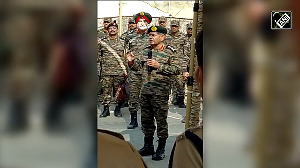Seeking to reassure India that the United States will not shift goalposts on the civilian nuclear deal, President George W Bush on Thursday spoke to Prime Minister Manmohan Singh who said India still had 'some concerns.'
Both leaders expressed hope that these would be addressed in the next stage of negotiations.
During the telephonic conversation, Dr Singh told the US President that India still has some concerns, though many have been addressed in Bush's signing statement, prime minister's Media Adviser Sanjaya Baru said.
The telephonic call from Bush came two days after he made it clear that the legislation he signed on Monday did not mean he endorsed all its contents and that he considered certain portions like seeking to restrict fissile material production and transfers of enrichment technology as merely 'advisory.'
Both Bush and Dr Singh expressed happiness at the 'strengthening' of the bilateral relations highlighted in the US President's initiative to amend American laws to enable bilateral civil nuclear cooperation, which received strong bipartisan support in the US Congress.
With Christmas and New Year round the corner, the prime minister conveyed the season's greetings to the US President and his family.
Ending India's 30-year-old nuclear isolation, Bush had on Monday signed the Henry J Hyde India-US Peaceful Energy Act allowing civilian nuclear trade with New Delhi, saying the step would make the world safer.
In a statement issued shortly after signing the Henry J Hyde US-India Peaceful Atomic Energy Cooperation Act, Bush had indicated that he did not agree with provisions like Section 103 and Section 104(d)(2) in the legislation.
Section 103 suggests that the US will oppose development of a capability to produce nuclear weapons by any non-nuclear weapon state within or outside the Nuclear Non-Proliferation Treaty regime.
The section says the US would work with Nuclear Suppliers Group members to further restrict transfers of equipment and technologies related to uranium enrichment, reprocessing of spent nuclear fuel and production of heavy water to all countries, including India.
The US government will also seek to prevent transfer of these equipment and technologies from other members of NSG or from any other source if the transfers are suspended or terminated.
Section 104(d)(2) stipulates that transfers cannot be effected to India without suitable changes in NSG guidelines. Bush said his approval of the legislation did not mean that he was endorsing it as US foreign policy.
The deal will be made operational by a separate 123 agreement between the two countries.
India will also have to sign a safeguard agreement with the IAEA besides which the 45-nation Nuclear Suppliers Group is required to change its guideline to allow international community to have nuclear commerce with India.
New Delhi's concerns relate to fuel assurances besides provisions in the American legislation, which appear to seek putting a cap on fissile material production and end-use monitoring of spent fuel.
Baru said the two leaders also discussed other subjects including regional matters.





